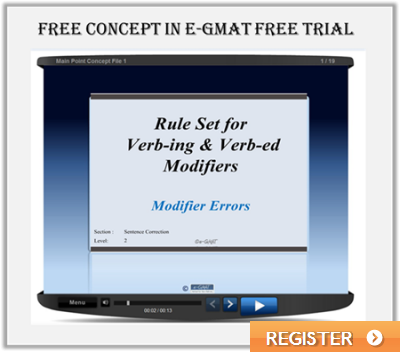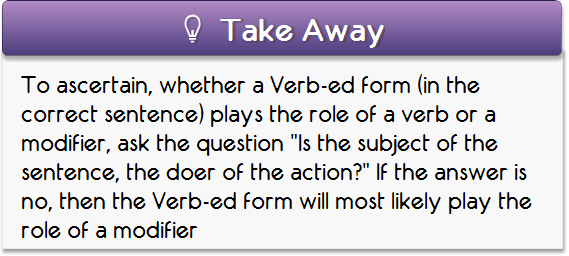

“ED FORMS” – VERBS OR MODIFIERS
Scientists have recently discovered what could be the largest and oldest living organism on Earth, a giant fungus that is an interwoven filigree of mushrooms and root like tentacles spawned by a single fertilized spore some 10,000 years ago and extending for more than 30 acres in the soil of a Michigan forest.This is probably one of the most discussed problems in GMAT Verbal SC section. This sentence is a cake walk for those who understand verb-ing and verb-ed modifiers thoroughly, and is confusing to the hilt for those who have just started to learn these concepts. The tactfully crafted answer choices of this problem keep bringing this question on various forums for discussion and detailed explanation. So let’s take a look at those interesting answer choices:

A. extending
B. extends
C. extended
D. it extended
E. is extending
In the first glimpse, the sentence looks simple and easy. You scan the sentence, discover the word “spawned”, look at conjunction “and”, think, “Oh! Parallelism dude. How simple!”, mark Choice C. But all the excitement is robbed off by the Answer Key page that says Choice A is the correct answer.
So where did you go wrong? Aren't “spawned” and “extended” grammatically parallel? They both have the same structure. The instinct (especially of the non-natives) is to believe that words with “ed” are simple past tense verbs. So if you took “spawned” to be the simple past tense verb, you looked for the same for “extending” and marked “extended”. You got the incorrect answer.
VERB-ED – CAN BE SIMPLE PAST TENSE OR MODIFIER
So, what is happening in this sentence? “Extended” fits as simple past tense verb and looks parallel to “spawned”. Then how can “extended” be incorrect? Well, the answer is that Verb-ed forms can be used in two ways –One as verb in simple past tense and the other as modifier (also called Verb-ed modifiers) and in this case it is used as the latter (explained later). In essence, the same word, for example extended, can assume the role of a verb in simple past form or that of a modifier. The challenge in the question is to determine whether “spawned” and extended” are verb-ed modifiers or just the verbs and then decide in what form should “extended” be used.

To determine that, let’s examine two simple examples:
a. The company extended the training period for the interns. – extended = simple past tense
b. The training period extended last year made many interns unhappy. – extended as verb-ed modifier
Let's analyze the meaning of sentence a. The sentence clearly conveys that that the company did the job of extending the training period for the interns. The word “extended” works as “verb” in this sentence.
Sentence b means that many interns became unhappy because the training period was extended. In this sentence, the verb is "made". "Extended" is the verb-ed modifier that is giving additional information about "the training period". So, here we see that the same word "extended" can work as a verb and as a modifier, depending upon how it has been used in the sentence. In fact, most of the words can be written as “verb” as well as “modifier” if we add “ed” to them. “Spawned” is also one of them.
If you want to know how to tell whether a verb-ed word is a simple past tense verb or a modifier, read in the following section about this simple test that can be very handy.

There is a simple test we can perform to find out whether the verb-ed is a verb in simple past tense or the verb-ed modifier. Here is the test:

Let’s have another look at both the examples above:
a. The company extended the training period for the interns.
The subject of the sentence above is “The Company” . Now ask yourself, “Is the subject the doer of the verb?” In other words, did the company extend the training. The answer is yes it did. The Subject Verb pair makes sense. Hence, in this sentence, extended is used as a verb in simple past.
b. The training period extended last year made many interns unhappy.
The subject here is “The training period”. The next word is the verb-ed “extended”. Is it a verb or a modifier? Ask this question: “Did “the training period” do the action of “extending”? The answer is “No”. The action of extension was not done by the training period. In other words, the Subject-Verb pair does not make sense. This tells you that “extended” is a verb-ed modifier here and not the verb.
 Scientists have recently discovered what could be the largest and oldest living organism on Earth, a giant fungus that is an interwoven filigree of mushrooms and root like tentacles spawned by a single fertilized spore some 10,000 years ago and extending for more than 30 acres in the soil of a Michigan forest.
Scientists have recently discovered what could be the largest and oldest living organism on Earth, a giant fungus that is an interwoven filigree of mushrooms and root like tentacles spawned by a single fertilized spore some 10,000 years ago and extending for more than 30 acres in the soil of a Michigan forest.Now let us apply this test on the “giant fungus”. After cutting the flab, this is the core that we get:
…a giant fungus… spawned by a single fertilized pore some 10,000 years ago…
So let’s ask, did “a giant fungus” do the action of “spawning”? The answer is “no” because it is clearly mentioned in the sentence that the action of spawning was done by “a single fertilized pore”. Hence, the litmus test confirms that “spawned” is a verb-ed modifier.
Therefore, to maintain parallelism we need to use a form of “extend” that is used as a modifier. Note that “extended” CAN be a verb-ed modifier. However, we need to find out if this form works in this sentence as a modifier:
…a giant fungus… extended for more than 30 acres in the soil of a Michigan forest.
Did “a giant fungus” do the job of extension? Yes, it did. It is the giant fungus that extends for more than 30 acres. This means that “extended” will work as simple past tense verb in this sentence and
not as a modifier. This is the reason why “extended” cannot be used since a verb CANNOT be parallel to a verb-ed modifier.
Let’s once again quickly look at the answer choices:
A. extending
B. extends
C. extended
D. it extended
E. is extending
A quick scan of these choices will tell you that all the answer choices B, C and E are verbs in different forms while Choice E is a clause. Choice A “extending” is the only modifier that describes one of the characteristics of “a giant fungus”. Hence, verb-ed modifier “spawned” and verb-ing modifier “extending” are parallel entities because they both perform the same function, although they differ structurally.
HOW VERB-ED MODIFIER IS DERIVED

This section is for those who have the grammarian like quest for knowledge. We will explain here in detail how verb-ed modifiers are derived. This knowledge is not imperative to take the GMAT, but is more for personal understanding as to why verb-ed modifiers work the way they do. So let’s bring the sentence with verb-ed modifier back here:
a. The training period extended last year made many interns unhappy.
Now this sentence can be written as:
i. The training period that was extended last year made many interns unhappy.
So, we have a relative pronoun clause here that is written in simple past tense in passive voice. Per the grammar rules, verb-ed modifiers are derived by removing the relative pronoun modifier that is written in passive voice by removing “the relative pronoun” and “the helping verb” (is/are/am/was/were). Hence we derive:
that was extended last year = was extended last year = extended last year
Let’s take another example:
b. A good leader who is followed by the mass and is respected for his benevolent qualities is always remembered for several generations.
So here we have two relative clauses with passive verbs “is followed” and “is respected”. Let’s turn both of them into verb-ed modifiers.
Who is followed by the mass = is followed by the mass = followed by the mass
Who is respected for his benevolent qualities = is respected for his benevolent qualities = respected for his benevolent qualities
c. A good leader followed by the mass and respected for his benevolent qualities, is always remembered for several generations
Notice that active verbs in relative pronoun clause cannot be turned into verb-ed modifiers. Let’s try this:
a. A leader who guides his followers honestly earns immense respect from the mass.
If we apply the rule to derive verb-ed modifier here, this is what we will get:
Who guides his followers = guides his followers
Notice the limitation with the sentence containing a relative pronoun in active voice and simple present tense. There is no question of getting verb-ed modifier here because originally there is no verb-ed word in this sentence.
This method will not work even if we change the tense of the above sentence:
a. A leader who guided his followers honestly earned immense respect from the mass.
Who guided his followers = guided his followers
Now let’s put this verb-ed modifier phrase in the sentence:
a. A leader guided his followers honestly earned immense respect from the mass.
No need to say that this sentence is a fragment because here “guided” is the simple past tense verb and not a verb-ed modifier. “earned” again is a verb . So this sentence has two verbs that are not connected properly. We landed up with this disaster because we tried to make the verb-ed modifier out of the verb in active voice in the relative clause.
HOW CAN THIS HELP YOU ANSWER GMAT SC?
People who are fluent in the language do not need to know the basics behind the derivation of the verb-ed modifiers because they intuitively know that sentence 1 is correct but sentence 2 is incorrect. They may not be able to pin point the reason for the same, but they can distinguish right from wrong. But people who are not that fluent in this language may get confused about the above. For example, one of the students asked me the following question about OG12#85:
Can I omit “that” from this sentence or is “that” required?
Salt deposits and moisture threaten to destroy the Mohenjo-Daro excavation in Pakistan, the site of an ancient civilization that flourished at the same time as the civilizations …The answer =
“that” is required because if you omit it, the sentence will be a run-on sentence. But consider another version of this sentence:
Salt deposits and moisture threaten to destroy the Mohenjo-Daro excavation in Pakistan, the site of an ancient civilization that was destroyed multiple times by flooding of Indus river…Now in this sentence,
“that” can be omitted (obviously along with “was”)
Salt deposits and moisture threaten to destroy the Mohenjo-Daro excavation in Pakistan, the site of an ancient civilization destroyed multiple times by flooding of Indus river…In essence, this information helps build your knowledge about the sentence structure, which in turn results in more solid foundation.
WHERE CAN YOU GET MORE INFORMATION?
Verb-ed modifiers are covered in detail in the concept titled “Modifiers – verb-ing”. This concept is available in the free preview of Sentence Correction course. You will need to login at
e-gmat.com to access this concept.

Identify whether the underlined words are verbs or verb-ed modifiers.
1. Like birds today, Archaeopteryx had feathers that were fully
formed.
2. Our powers of color vision are derived from cells in our eyes
called cones, three types in all, each
triggered by different wavelengths of light.
3. As Joel Bregman
hoped, dozens of young stars
turned up in each of the three dead galaxies—and as an
added surprise, they even
appeared in Messier 105.
4. Dark matter might actually be produced at the energies
explored by the world’s most powerful particle accelerator, the Large Hadron Collider (LHC).
5. A leader
guided by sound principles
earned immense respect from the masses.
6. A company
founded on sound business principles achieves much higher success.
7. The lamp
decorated with stars
filled the child’s room with innocent beauty.
Correct these sentences if you feel they are incorrect.
1. The lamp decorated the child’s room filled his room with innocent beauty.
2. A leader guided his followers earned immense respect from the masses.
(PS: For solutions, please scroll down)













![]() ED forms- Verbs or Modifiers.pdf [393.75 KiB]
ED forms- Verbs or Modifiers.pdf [393.75 KiB] ![]() Verb-ed Modifier _ How is it derived.docx [24.86 KiB]
Verb-ed Modifier _ How is it derived.docx [24.86 KiB] 

